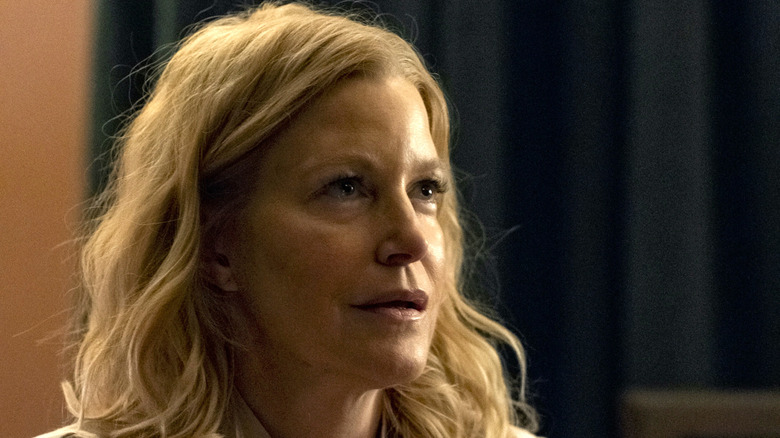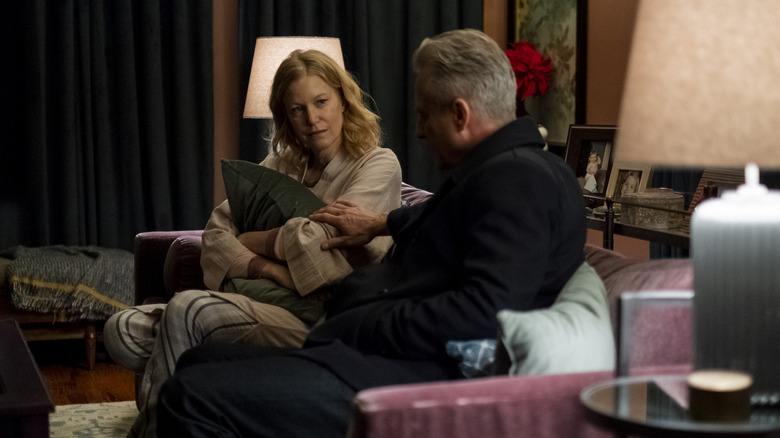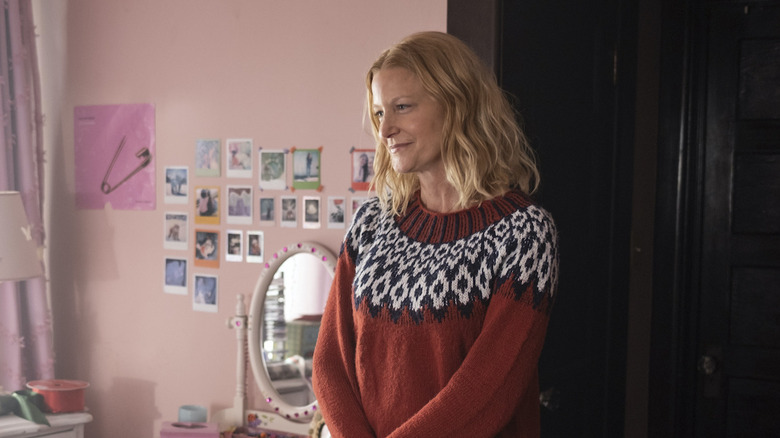The Apology Review: Apologies Are In Order
- Strong performances
- Engaging set-up
- The story gets more preposterous as it goes on
- A muddled feminist message
"The Apology" begins with a long shot of snowy woods that gradually meanders towards an isolated house as ominous music plays. It's an announcement of the film's intention to be a chilly thriller, but it also doubles as a warning to viewers of the slog ahead.
"The Apology" is an (almost) single-location, two-hander centered on an unexpected meeting between Darlene (Anna Gunn), a recovering alcoholic whose 16-year-old daughter went missing 20 years ago, and her former brother-in-law Jack (Linus Roache), who shows up at her home unexpectedly on Christmas Eve as she's making preparations to host her family for the holiday for the first time in decades.
While the Christmas decorations make for a festive backdrop — and production designer Tom Obed and his team do a fantastic job creating a series of visually varied but interesting spaces in the house where the film takes place — there's nothing festive about this scenario. Darlene hasn't seen Jack in 19 years, the same amount of time she's been sober. He left in the wake of Darlene's daughter's unsolved disappearance, and needless to say, when he shows up late at night during a snowstorm on her doorstep, Darlene is surprised to see him.
Jack insists he wants to make amends with his ex-wife, Darlene's sister, and their kids by spending Christmas with them, but given the movie's provocative title and its thriller trappings, it's not a spoiler to say Jack has more on his mind than he initially admits. By the time he starts to put away the kitchen knives and shows off his collection of zip ties, Darlene gets the picture, too, and soon the story devolves into a series of increasingly preposterous scenarios as Darlene and Jack square off verbally and soon physically throughout her house.
Strong performances, ridiculous story
Before Jack decides it's time to unburden himself, the setup of "The Apology" is fairly engaging. Both Gunn and Roache deliver strong, nuanced performances that establish the comfort and familiarity of Darlene and Jack's relationship even after a long time apart. And their easy back and forth provides a glimpse into their characters' perspectives and preoccupations. Gunn, a two-time Emmy Award winner for her role as Skyler White on "Breaking Bad," is particularly effective as a woman who continues to be haunted by the question of what happened to her daughter two decades ago — an event she feels especially guilty about because she was drunk on the day it happened.
Despite the film's single location, writer and director Alison Star Locke, making her feature debut, does a good job using the different rooms that make up Darlene's house to ensure the movie feels dynamic. Single location movies can often come across as filmed plays, but despite the dialogue-heavy story, "The Apology" never feels stuck in one place as the action moves from the living room decorated for Christmas to the cozy kitchen to the spare basement.
Moreover, although the script foreshadows what's to come, in the film's earliest scenes, Locke creates an involving back and forth between Darlene and Jack along with enough atmosphere to keep viewers intrigued. Once Jack reveals why he's really there, however, Locke doesn't quite seem to know where to go. While the actors do what they can with the material, their characters' motivations become increasingly murky as the story goes on.
It doesn't help that it's challenging to believe a lot of what both characters say, an issue the film either fails to recognize or chooses to ignore, which makes their confessions and violent outbursts all the more questionable. In an effort to stretch the film to feature length, Locke extends the story past the limits of credibility. By the time Darlene's best friend and neighbor Gretchen (Janeane Garofalo) shows up in the final act (after a brief appearance at the beginning of the film), things have gotten so ludicrous, her astonishment at what's going on in her friend's house leads to several moments of inadvertent levity, and for a moment it seems like the movie might reach so-bad-it's-good territory. Unfortunately, the feeling doesn't last.
A muddled feminist message
With its focus on female pain and guilt, "The Apology" appears to want to convey a feminist message about how women often take on men's most difficult emotions — and how men expect them to. Thankfully, the film's conclusion helps drive this point home while pushing against it as Darlene finds her power in horrifying circumstances. In between, however, that theme is overpowered by a plot that quickly paints itself into a corner, and as a result, often falls prey to eye-roll worthy genre tropes that make the characters hard to sympathize with or relate to. This muddles the film's feminist impulses, making them easy to overlook.
Ironically, even as the film attempts to physically embody the central conflict between Darlene and Jack through action beats, it frequently cuts away from their altercations, instead focusing on a static image in the room as the characters' fights are heard in the background instead of seen. While this may have been a necessary choice due to the film's indie budget, it's another way that it distances viewers from Darlene's plight and makes it harder to buy into the story.
Ultimately, although "The Apology" starts and ends strong and features a trio of solid performances, none of that can overcome the way the story bides its time with increasingly ludicrous situations and half-baked ideas. By the time the movie wraps up, viewers who join Darlene for this fateful meeting with Jack may come away feeling like they deserve an apology, too.
"The Apology" will be in theaters and streaming on Shudder and AMC+ on December 16.


